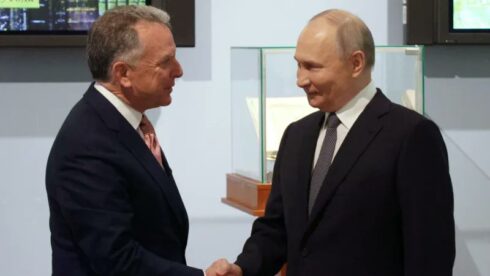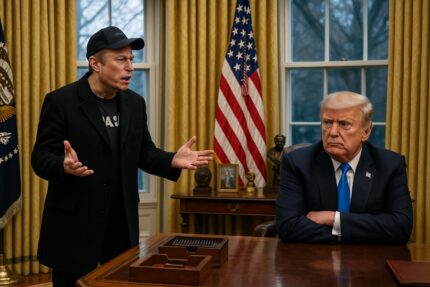President Donald Trump aides Steve Witkoff held a lengthy four-hour meeting with Russian President Vladimir Putin in St Petersburg on Friday. The Kremlin confirmed that the talks focused on “aspects of a Ukrainian settlement,” marking Witkoff’s third meeting with the Russian leader this year. According to Russia’s special envoy Kirill Dmitriev, who hosted Witkoff earlier at the Grand Hotel Europe, the meeting was “productive” and part of ongoing efforts to “normalise relations” between Washington and Moscow.
The meeting comes amid increased international efforts to seek a resolution to the ongoing conflict in Ukraine, now well into its third year. Kremlin spokesman Dmitry Peskov urged caution ahead of the talks, saying, “There is no need to expect breakthroughs.” Still, speculation mounted about whether the talks could pave the way for a future meeting between Trump and Putin, with Peskov simply responding: “Let’s see. It depends on what Witkoff has come with.”
Trump Ramps Up Pressure on Putin: ‘Too Many Are Dying’
President Donald Trump, who recently returned to the White House, took to social media on Friday to express his mounting frustration with Putin’s handling of the war. “Russia has to get moving. Too many people ere [sic] DYING, thousands a week, in a terrible and senseless war,” he wrote, underscoring a more urgent and emotional appeal for a ceasefire.
Trump, who has long claimed he could end the war in Ukraine within 24 hours, reiterated his belief that the conflict would never have occurred had he been in office in 2022. “A war that should ld [sic] have never happened, and wouldn’t have happened, if I were President!!!” he posted. Trump also said he was “very angry” with Putin for stalling on ceasefire negotiations, adding that progress had been hampered by “too many disagreements” and a lack of trust.
Trump’s tone suggests growing impatience with both Russia and Ukraine. Despite his past support for Kyiv, relations with President Volodymyr Zelensky have reportedly cooled, especially after a tense Oval Office confrontation in February. Trump has also been critical of NATO allies, urging them to step up their military aid as the human toll in Ukraine escalates.
Kellogg’s Controversial Comments Spark Partition Fears
Amid renewed efforts to broker peace, controversy erupted following reported remarks from Trump’s Ukraine envoy, retired Lt. Gen. Keith Kellogg. The Times claimed Kellogg had floated the idea of deploying British and French troops to control zones in western Ukraine, while allowing Russian forces to remain in the east—a proposal eerily reminiscent of Berlin’s post-World War Two division.
“You could almost make it look like what happened with Berlin after World War Two,” Kellogg was quoted as saying. However, Kellogg swiftly denied advocating for a partition, taking to social media to clarify: “I was speaking of a post-ceasefire resiliency force in support of Ukraine’s sovereignty… I was NOT referring to a partitioning of Ukraine.”
The remarks sparked anxiety among Ukrainian officials and Western observers, though Kyiv and the White House have yet to issue official responses. The backlash reflects the sensitivities surrounding any suggestion that Ukraine’s territorial integrity could be compromised in pursuit of peace.
Zelensky Accuses Russia of War Crimes, Seeks Air Defenses
Ukrainian President Volodymyr Zelensky, visiting the site of a deadly missile strike in his hometown of Kryvyi Rih, condemned Russia for prolonging the war. The April 4 attack killed 19 people, including nine children. Zelensky accused Moscow of using foreign fighters, claiming, “We have information that at least several hundred Chinese nationals are fighting as part of Russia’s occupation forces.”
Zelensky called on the West to bolster Ukraine’s air defense systems, saying his country was ready to purchase them. “We discussed this with President Trump — Ukraine is not just asking, we’re ready to purchase these additional systems,” he wrote online. “Only powerful weapons can truly be relied upon to protect life when you have a neighbor like Russia.”
Zelensky also laid flowers at the memorials of children killed in the missile attack, including Herman Tripolets, nine, and seven-year-olds Arina Samodina and Radyslav Yatsko. His visit served as a stark reminder of the human cost of the war, even as international diplomacy inches forward.
New Diplomatic Channels and Prisoner Swap Signal Shifting Dynamics
Though a comprehensive ceasefire remains elusive, recent developments point to evolving U.S.-Russia diplomacy. In February, American and Russian officials met face-to-face in Saudi Arabia for the first time since the 2022 invasion. The talks reportedly focused on restoring diplomatic ties, though no formal agreements were reached.
Earlier this week, the U.S. and Russia also completed a prisoner exchange. Russian-American Ksenia Karelina, sentenced to 12 years in Russia for donating to a Ukrainian charity, was freed and swapped for Arthur Petrov, a dual German-Russian national accused of illegally exporting microelectronics to the Russian military. The swap was seen as a rare point of cooperation amid rising tensions.
Meanwhile, European defense ministers announced €21 billion in new military aid for Kyiv, insisting there were no signs the war was nearing its end. These multiple fronts—military, diplomatic, and humanitarian—underscore the war’s complexity and the increasingly internationalized effort to bring it to a close. Whether Witkoff’s meeting with Putin will yield concrete results remains uncertain, but the push for peace, from Washington to Kyiv, appears more intense than ever.














